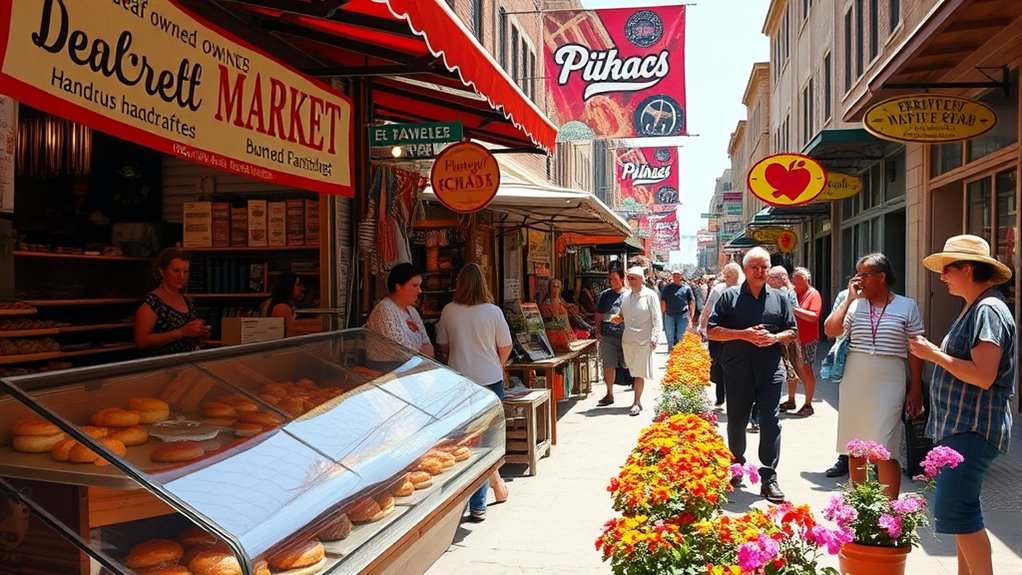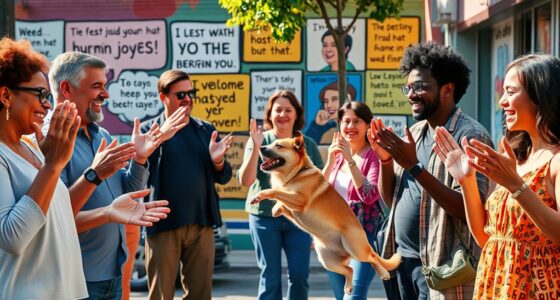Supporting Deaf-owned businesses is a rewarding way to uplift the community and celebrate unique talents. You’ll find inclusive cafés, food trucks, and restaurants that not only serve delicious food but also foster cultural pride and awareness. Engage with these businesses to build connections and promote economic independence within the Deaf community. Plus, your support helps them thrive and create impactful experiences. If you want to discover more about the vibrant Deaf entrepreneurship landscape, keep exploring!
Key Takeaways
- Support Deaf-owned restaurants and cafés like Signature Deaf Chef Creations for unique culinary experiences and cultural pride.
- Visit Mozzeria in San Francisco, where an all-Deaf staff ensures full communication access for patrons.
- Explore food trucks operated by Deaf chefs, showcasing diverse flavors while promoting inclusivity and accessibility.
- Engage with the Starbucks Signing Store in D.C. for an enhanced customer experience through ASL-proficient staff.
- Attend community events and cultural festivals to celebrate Deaf entrepreneurship and strengthen connections within the Deaf community.
Deaf Entrepreneurship Landscape Overview

In the world of Deaf entrepreneurship, Signature Deaf Chef Creations stands out as a tribute to creativity and passion. You’ll find that many Deaf chefs not only showcase their culinary skills but also embrace their unique experiences to build thriving businesses. As you explore this landscape, you’ll see how these chefs contribute to both the food industry and the Deaf community. Many of these entrepreneurs started their businesses before age 35, demonstrating that early entrepreneurial spirit can lead to success in the Deaf community. Additionally, their journeys reflect the importance of continuous learning in adapting to challenges and growing their enterprises. The ability to network effectively is also crucial, as it opens doors to new opportunities and collaborations within the industry. By fostering community connections, Deaf entrepreneurs can further enhance their impact and support systems. Furthermore, the cultural impact of their businesses often resonates with broader audiences, creating a unique blend of culinary art and personal expression.
Signature Deaf Chef Creations
Signature Deaf Chef Creations stands as a beacon of innovation within the Deaf entrepreneurship landscape. These businesses not only create delicious culinary experiences but also foster inclusivity and cultural pride. By supporting Deaf-owned food ventures, you’re helping to empower the Deaf community and promote unique flavors and ideas. The Deaf Chefs, for instance, serves as a platform for education about British Sign Language (BSL) while delivering diverse cuisine on their food truck. Additionally, many Deaf-owned businesses emphasize the importance of community support, showcasing how collaboration can enhance visibility and success. High cultural intelligence (CQ) is essential for these businesses to effectively engage with diverse customers and create meaningful connections. Furthermore, understanding user privacy is crucial for maintaining trust in business relationships. Establishing financial considerations for these enterprises can also play a significant role in their long-term sustainability and growth.
| Business Name | Specialties | Unique Features |
|---|---|---|
| The Deaf Chefs | Diverse cuisine | BSL education on the food truck |
| Pi00a Pizza | Unique pizza flavors | Employment for Deaf workers |
| Mozzeria Pizzeria | Neapolitan-style pizza | ASL-centered training programs |
Engaging with these enterprises means you’re contributing to job creation, innovation, and a vibrant cultural exchange. Together, let’s celebrate and uplift Deaf chefs and their remarkable contributions!
Deaf-Friendly Urban Centers
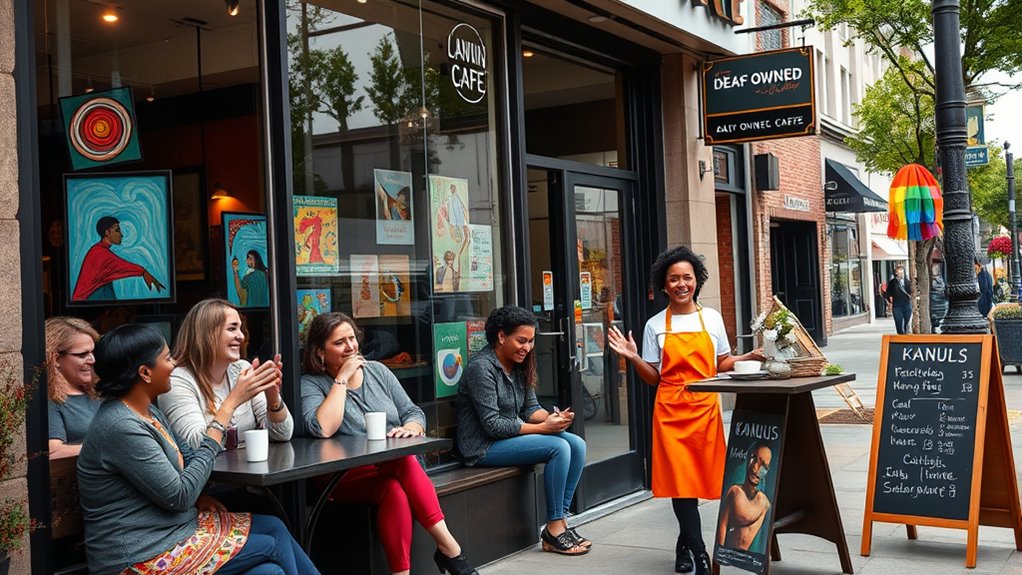
In Deaf-friendly urban centers, you’ll find thriving Deaf communities that foster connection and collaboration. You might discover underrated Deaf-owned cafés that serve as gathering spots, while also supporting local ASL classes to promote language learning. These elements create a vibrant atmosphere that celebrates Deaf culture and strengthens community ties. The recent designation of Newport Beach as the first Deaf-Friendly City in the U.S. highlights the growing importance of inclusivity in urban environments. Furthermore, businesses in these areas often incorporate universal design principles to enhance accessibility and comfort for everyone. Many of these establishments also focus on financial health, ensuring they are sustainable and can continue to serve their communities. Additionally, many of these businesses prioritize safety and durability in their offerings, ensuring a welcoming environment for all patrons. By shopping at these establishments, you contribute to community empowerment and support the local economy.
Thriving Deaf Communities
Creating a thriving Deaf community often hinges on establishing deaf-friendly urban centers that prioritize inclusion and accessibility. These urban centers foster a supportive environment, amplifying the voices of Deaf individuals while promoting cultural engagement. Key characteristics include:
- Community Resources: Availability of deaf education centers and support organizations. Visualization techniques can also be beneficial for enhancing community engagement and participation. Additionally, offering candy varieties uniquely crafted for events can foster social interaction and enjoyment among community members. Furthermore, these centers can provide mental health resources to support the emotional well-being of Deaf individuals. This support system is crucial for fostering unconditional love and support within the community.
- Political Inclusion: Ensuring Deaf voices are part of the decision-making process.
- Cultural Events: Hosting activities that strengthen community bonds and belonging.
- Attitudinal Openness: Fostering a positive attitude among hearing residents toward Deaf individuals.
When urban centers embrace these principles, they not only enhance the quality of life for Deaf residents but also contribute to a richer, more inclusive community for everyone. Additionally, the recent Deaf-Friendly Cities Report highlights the importance of understanding the diverse needs of the deaf community. Supporting deaf-friendly cities is essential for empowering the Deaf ecosystem.
Underrated Deaf-Owned Cafés
Underrated Deaf-owned cafés play a significant role in building deaf-friendly urban centers that prioritize inclusivity and accessibility. Places like Bravo Coffee in Taipei utilize point-and-order menus, making communication seamless for everyone. Notably, the café is owned by a Deaf couple who emphasize the importance of community through their establishment, fostering creative practice among patrons who engage with one another. In Japan, Sign with Me fosters social interaction by promoting Deaf culture and Japanese Sign Language. Additionally, these cafés often implement proper diet practices by providing healthy food options that cater to diverse dietary needs, enhancing the overall experience. Moreover, these cafés often create spaces where color accuracy enhances the overall ambiance, making visits enjoyable. Meanwhile, the Starbucks Signing Store in Washington, D.C., features ASL-proficient staff, enhancing the customer experience. Mozzeria in San Francisco takes communication a step further with all-Deaf servers, ensuring full access. Finally, 1000 & 1 Signes in Paris celebrates Deaf culture through unique culinary experiences.
Support Local ASL Classes
While many people recognize the importance of communication, few understand how learning American Sign Language (ASL) can transform interactions within the Deaf community.
Supporting local ASL classes in urban centers offers several benefits:
- Community Engagement: Connect with Deaf individuals and foster relationships, which can enhance co-parenting communication and understanding in diverse family dynamics. This interaction promotes emotional regulation, helping all participants develop stronger connections.
- Cultural Awareness: Gain insights into Deaf culture and its significance, which can be enhanced by understanding traditional healing practices in Aboriginal cultures.
- Accessibility: Increased opportunities for anyone interested in learning sign language, especially through affordable ASL classes.
- Economic Impact: Empower the Deaf community by creating job opportunities.
Deaf-Owned Food Trucks
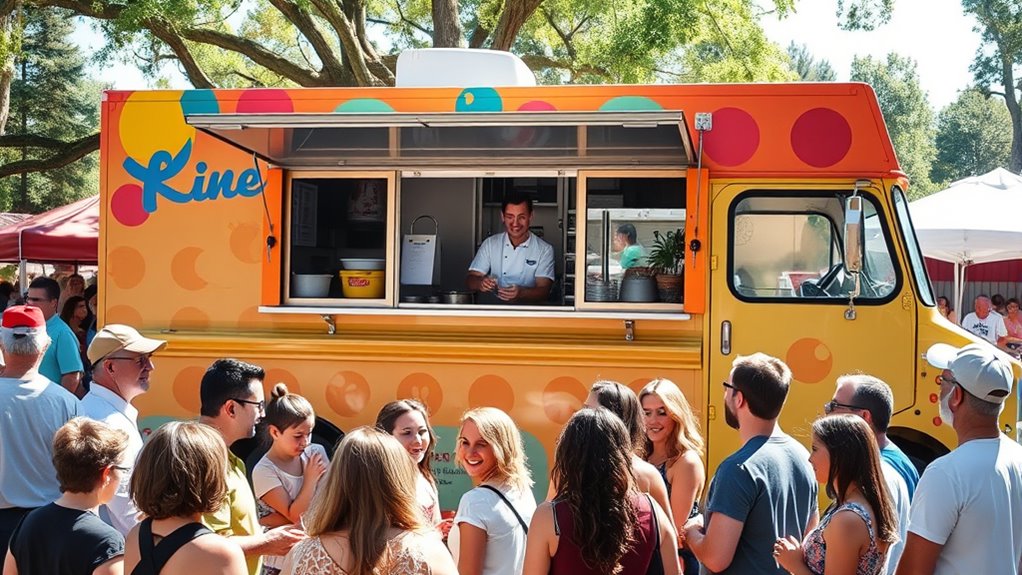
Deaf-owned food trucks bring unique flavors to the streets, showcasing the culinary talents of Deaf chefs. You’ll find artisanal wine and craft spirits paired perfectly with their innovative dishes, making each visit a memorable experience. Plus, many food trucks offer culinary workshops, allowing you to learn directly from these talented chefs and appreciate their craft. Supporting Deaf-owned businesses not only enhances your dining experience but also contributes to the economic empowerment of the Deaf community.
Deaf Chef’s Unique Flavors
When you explore the world of Deaf-owned food trucks, you’ll discover a vibrant tapestry of flavors that reflect both culinary creativity and cultural heritage. These food trucks not only serve delicious dishes but also create employment opportunities for the Deaf community. Accessibility and inclusivity are at the forefront of their service, ensuring that all patrons feel welcome and catered to. Here are some unique offerings you might find:
- Hand-thrown pizzas from Pizza Fab, cooked in a wood-burning oven.
- Moroccan-inspired couscous and slow-cooked meats from 1000 & 1 Signes.
- Savory crepes from Crepe Crazy, which started as a food truck.
- Cultural fusion dishes that blend international flavors with local favorites.
Each truck showcases not only amazing food but also accessible communication methods, ensuring everyone can enjoy the experience.
Artisanal Wine and Craft Spirits
As you immerse yourself in the world of artisanal wine and craft spirits, you’ll find an exciting intersection of creativity and community engagement among Deaf-owned food trucks.
While specific Deaf-owned food trucks focused on wine and spirits are scarce, the potential for innovation is enormous. Imagine food trucks that curate unique pairings of local wines, like those from Fattoria la Muraglia or ARNYCA Cellars, enhancing the culinary experience for everyone. By connecting with a Deaf-owned winery, these trucks could offer a truly unique experience that celebrates both wine and culture.
These ventures can foster cultural exchange, bridging gaps between Deaf and hearing communities. By supporting Deaf-owned food trucks, you’re not just enjoying great flavors; you’re promoting economic empowerment and inclusivity.
Incorporating accessibility features, like sign language support, further enriches the experience for all customers.
Culinary Workshops With Deaf Chefs
Culinary workshops led by Deaf chefs offer a unique opportunity for food enthusiasts to engage directly with diverse cuisines while gaining insight into Deaf culture. You’ll experience a vibrant mix of flavors and learn about innovative communication methods that enhance the experience. Here are some highlights:
- Explore diverse cuisines like Italian, Moroccan, and vegan options.
- Enjoy hands-on cooking sessions in an inclusive environment using ASL.
- Discover how Deaf-owned food trucks foster community and provide employment opportunities for an underemployed population.
- Witness the creative use of technology, like laminated menus and writable countertops, to guarantee seamless communication.
Must-See Sights

When exploring Deaf culture, you can’t miss the rich experiences offered by Deaf heritage museums and vibrant cultural festivals. Deaf-owned businesses are often featured at these events, showcasing the diverse talents and entrepreneurial spirit within the community. Stunning national parks also provide breathtaking backdrops for community gatherings and celebrations. Plus, supporting Deaf artists’ work gives you a unique glimpse into their creativity and perspective.
Deaf Heritage Museums
Exploring Deaf heritage museums offers a unique glimpse into the rich tapestry of Deaf culture and history, showcasing the stories and experiences that shape this vibrant community. Visiting these museums connects you with crucial aspects of Deaf life, from its educational history to its cultural significance. Many of these institutions are increasingly focusing on enhanced communication methods to ensure accessibility for all visitors.
Here are a few must-see highlights:
- American School for the Deaf Museum: Immerse yourself in the history of Deaf education in the U.S.
- Finnish Museum of the Deaf: Enjoy both physical and virtual exhibitions.
- Brother Leothard Deaf Museum: Experience European Deaf culture.
- National Deaf Life Museum: Discover a broader perspective on Deaf life and culture.
These museums are essential for preserving Deaf heritage and fostering community engagement.
Stunning National Parks
If you’re looking to connect with nature, stunning national parks across the U.S. offer breathtaking sights and diverse experiences that cater to every outdoor enthusiast.
From the vast deserts of Big Bend National Park, where the Rio Grande flows, to the unique hoodoos in Bryce Canyon, each park showcases distinct landscapes. Acadia’s rugged coastline and Grand Teton’s majestic peaks promise unforgettable views. You can hike, camp, or raft, immersing yourself in vibrant ecosystems and wildlife. Don’t miss scenic drives like Glacier National Park’s Going-to-the-Sun Road or the Badlands Loop Road for accessible views and spectacular vistas.
Many parks also provide accessible options, ensuring everyone can enjoy their beauty. So pack your bags and get ready for an adventure!
Deaf Cultural Festivals
Deaf cultural festivals offer a vibrant celebration of identity and creativity, inviting you to immerse yourself in a rich tapestry of arts, performances, and community spirit. These events not only showcase the unique talents of the Deaf community but also foster connections among attendees. In addition to providing entertainment, they promote linguistic, social, and cultural rights of the Deaf community, creating a more inclusive society.
Here are some must-see festivals:
- Deaflympics: An international multi-sport event for Deaf athletes.
- Toronto International Deaf Film and Arts Festival (TIDFAF): Promotes Deaf filmmakers and artists.
- Clin d’Oeil Festival: Europe’s largest Deaf cultural festival with diverse performances.
- Deaf Festival Los Angeles: A family-friendly event celebrating Deaf culture through art.
Attending these festivals helps you appreciate the vibrancy of Deaf culture while supporting Deaf artists and their communities.
Support Deaf Artists’ Work
Celebrating Deaf culture through vibrant festivals is just one way to appreciate the creativity within the community. Supporting Deaf artists’ work offers a deeper connection to their experiences and history.
Explore De’VIA art, which captures themes of identity and audism, often incorporating ASL signs to express the essence of Deaf culture. You’ll find notable artists like Nancy Rourke and Chuck Baird, whose vibrant pieces reflect the struggles and triumphs of Deaf life, including Rourke’s involvement in the DeVIA art movement.
Engage with tactile art and performance pieces that invite participation and understanding. Digital platforms, including social media and online exhibitions, allow you to discover and support these artists from anywhere.
Your support helps break barriers and fosters a greater appreciation for Deaf culture.
Practical Tips
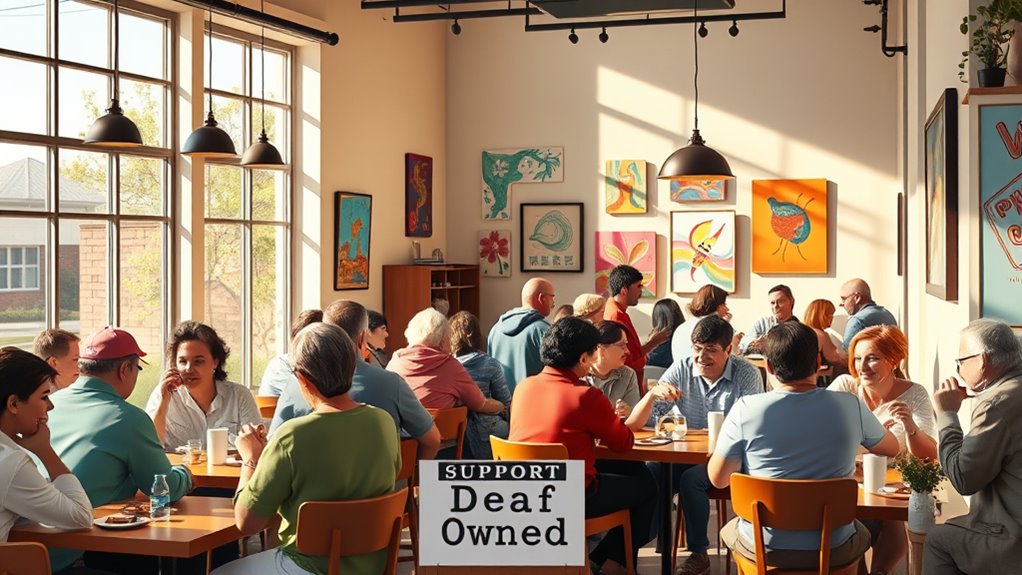
When planning your visit to Deaf-owned businesses, it’s crucial to contemplate practical tips that can enhance your experience. Think about how you’ll get there, the best times to visit, and where you’ll stay to make the most of your trip. Additionally, being aware of the visual communication strategies used in these spaces can help you connect better with the community and fully enjoy what these businesses offer. Also, understanding local etiquette can help you connect better with the community and fully enjoy what these businesses offer.
Getting There
Starting a deaf-owned business involves several practical steps that can set you up for success. Here are some tips to help you navigate the journey:
- Utilize Video Relay Service (VRS) for effective communication with hearing clients.
- Invest in broadband internet to enhance connectivity and support digital tools. This investment can also help you access resources that support your writing and research, akin to those found in educational handbooks.
- Leverage deaf-focused business support services, like the Deaf Entrepreneurs of America Foundation, for valuable resources.
- Engage in networking opportunities through platforms like the Deaf Entrepreneur Network to connect with fellow entrepreneurs.
Getting Around
Maneuvering the world of transportation can be challenging, especially for Deaf individuals. Fortunately, there are innovative solutions to enhance accessibility. Using services like Convo Access, you can easily access sign language interpretation through QR codes in transit systems. The MTA’s efforts also aim for real-time communication between Deaf customers and transit staff. Recently, a pilot program involving New York transit agencies has shown promising results in improving accessibility for Deaf passengers.
Here are some tips for traversing transportation:
| Tip | Description | Benefits |
|---|---|---|
| Use QR Codes | Scan codes for instant interpretation | Enhances communication |
| Leverage Apps | Download transit apps with accessibility features | Convenient trip planning |
| Connect with Staff | Approach staff trained in Deaf accessibility | Facilitates smoother interactions |
Best Time to Visit
Visiting Deaf-owned businesses can be a rewarding experience, especially if you choose the right time to go.
To make the most of your visit, consider these tips:
- Peak Hours: Try to avoid busy times like 8-10 am at popular spots like Bravo in Taipei.
- Weekends: Saturdays are bustling, so if you want a quieter experience, aim for a weekday visit. Additionally, visiting during local Deaf community gatherings can provide a richer understanding of the culture.
- Cultural Events: Plan your visit during local Deaf community gatherings to enhance your experience.
- Accessibility Features: Check if the business has accessible communication methods, such as sign language support.
Where to Stay
When planning your stay, it’s essential to choose accommodations that cater to your needs and preferences. Consider staying at deaf resorts, which provide a luxury, sign language-friendly environment. Accessible hotels comply with ADA requirements, guaranteeing both physical and communication accessibility. Look for deaf-friendly venues that focus on the needs of deaf guests, featuring trained staff who can communicate effectively. Many hotels now offer sign language interpreters and visual aids to enhance your experience. Utilize inclusive booking platforms to easily find accessible accommodations. Additionally, culturally enriching experiences can be found in hotels that provide activities tailored to the deaf community. Also, check for visual signage, captioned media, and assistive listening systems to guarantee a seamless stay. By prioritizing these features, you’ll have a more enjoyable and stress-free experience during your travels.
Local Etiquette
How can you guarantee respectful and effective communication with deaf individuals? Start by being mindful of your approach. Here are some practical tips to enhance your interactions:
- Speak clearly without exaggerating your mouth movements; yelling can be offensive.
- Maintain eye contact to show respect and engagement in the conversation. This is crucial because eye contact is a fundamental aspect of communication in the Deaf community.
- Use gentle taps or waves to get a deaf person’s attention without startling them.
- Choose well-lit areas for discussions to facilitate effective visual communication.
Pro Tip
Supporting deaf-owned businesses goes beyond simple patronage; it involves actively engaging with their unique needs and challenges. Here are some practical tips to help you make a meaningful impact:
| Tip | Explanation | Benefits |
|---|---|---|
| Financial Support | Regularly purchase products/services. | Maintains positive cash flow. |
| Avoid Free Services | Don’t ask for freebies; it strains resources. | Helps cover operational costs. |
| Loyalty Rewards | Be a loyal customer to earn appreciation perks. | Builds strong community ties. |
| Economic Advocacy | Use your purchasing power to support growth. | Promotes financial independence. |
Additionally, understanding the importance of the writing process in effective communication can enhance your ability to advocate for these businesses.
Frequently Asked Questions
How Can I Find More Deaf-Owned Businesses in My Area?
To find more Deaf-owned businesses in your area, start by checking online directories like Deaf Services Unlimited.
You can also explore social media platforms, where many businesses promote their offerings.
Attend local Deaf community events to network and discover businesses firsthand.
Consider using Deaf-friendly platforms that list these establishments, and ask for recommendations within the community.
Engaging with local networks can lead you to hidden gems you mightn’t find otherwise.
Are There Online Directories for Deaf Entrepreneurs?
Yes, there are several online directories specifically for Deaf entrepreneurs.
On one hand, you have the extensive Deaf Ecosystem Directory, which connects you to a variety of Deaf-owned businesses.
On the other, platforms like DeafRead curate important content tailored for Deaf business owners.
Both resources provide crucial information and support, helping you navigate the entrepreneurial landscape.
Utilizing these tools could enhance your networking opportunities and access to essential resources in the Deaf community.
What Resources Support Deaf Individuals in Starting Businesses?
If you’re looking to start a business, several resources can support you as a deaf individual.
The Small Business Administration offers ASL assistance and planning tools.
Gallaudet University and RIT provide valuable educational programs.
Online communities like the Deaf Small Business Network and Facebook groups connect you with mentors and peers.
Additionally, Video Relay Service helps facilitate communication, making it easier for you to engage with clients and partners.
Can I Collaborate With Deaf-Owned Businesses for Events?
Absolutely, you can collaborate with Deaf-owned businesses for your events!
Doing so enhances accessibility and fosters inclusivity, making your event welcoming to everyone. You’ll gain unique perspectives and innovative solutions that enrich the experience.
Plus, partnering with these businesses strengthens community ties and promotes word-of-mouth support.
Just guarantee you incorporate sign language interpreters and educate your staff on Deaf culture to create a truly inclusive atmosphere.
How Can I Learn Basic Sign Language to Communicate Better?
Imagine standing on the edge of a vibrant party, surrounded by laughter but feeling isolated because you can’t join in. Learning basic sign language can bridge that gap.
Start with the ASL alphabet and fingerspelling, using online resources like YouTube tutorials. Practice common phrases with friends, and immerse yourself in Deaf culture.
You’ll not only improve communication but also connect with others on a deeper level, breaking down barriers and fostering understanding.
Conclusion
Supporting deaf-owned businesses is like planting seeds in a vibrant garden; each purchase helps them bloom and thrive. By choosing to shop and dine at these unique places, you’re not just enjoying their offerings—you’re also celebrating their culture and resilience. As you explore deaf-friendly urban centers and indulge in delicious food trucks, remember that your support can make a world of difference. Let’s uplift these entrepreneurs and watch their dreams blossom into bright realities!

